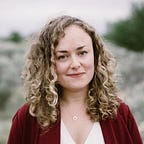Should We Interrupt
Dear Diana,
Packing for my flight today, my stomach churned, as always. I’m scared of heights. I’m claustrophobic. I have a wild imagination. Flying is my perfect storm of misery.
Today’s different. I’ve triple-checked that I’ve got both my passport and my license. I’ve made even more sure that nothing weird in my suitcase could call attention to me and get me stopped. (Last time it was candles, a gift I’d received. Who knew?)
Some might say I’m being over-cautious. (It’s a domestic flight! You don’t need two forms of ID!) But I know you’ll understand. You’re a double- and triple-checker too. Even more, your depth of empathy and intuition are remarkable.
The two of us have so much in common—it’s ridiculous. Since we became friends over a decade ago, we’ve shared so many joys and sorrows. Sometimes we hit heart-wrenching loss or exhilarating possibility right at the same time. Sometimes—one, two—one of us soon after the other.
Today I can’t help but acknowledge a difference between us. Let me try to explain, through memories that bubble up now as I count down to my flight time.
I wonder, when people ask, “Where are you from?” And you reply, “Michigan” or “Ann Arbor,” do they ever ask again? Do they ever say, “But where are you really from?”
They do when they ask me, almost always. First I reply, “Pennsylvania.” When they probe, I say, “a tiny town outside of a very small city. You won’t know it, I’m sure.”
Still, many people I meet for the first time search for something more. On the one hand, many people read me as a white American, somewhat midwestern. On the other, many catch a glimpse of something other and search for help placing it.
For some, it’s something about my complexion or curly hair. Others perceive an accent, which I can’t for the life of me explain. English is my mother tongue. I’ve studied a few languages, but only in school, and never achieved fluency.
For others, it’s puzzlement over my last name. “SAN-chez,” they ponder (it’s “SAHN-chez”), “is that your dad or your husband that’s Mexican?”
As it turns out, I’m American, so is my husband, who has his own last name, and so is my dad, who was born in Puerto Rico. Why does this matter? I’ll keep trying to explain.
Diana, I draw such strength from our friendship, from the things we share in common, from the believing mirror you are to me. In contrast, I remember the first time I was leveled by the otherness others saw in me.
It was my senior year of high school. I had stayed up all night waiting for news from Harvard’s early admissions. At school the next morning, I rushed to the guidance counselor’s office to share the news: I got in!
Later that day I was called to the principal’s office. A pang of worry hit me. Had I done something wrong? Was it a dream—they’d changed their minds? Maybe I’d misread the email. Maybe I’d made a mistake that would somehow interrupt my dream.
I was rushed into a small room with someone who turned out to be a reporter. I was so confused. I tried to be nice. It was far into the conversation before I realized I wasn’t in trouble.
Later an article was published about me. I can’t seem to find it, but I remember the headline: “Coming to America!”
It socked me in the gut. Coming from where, I wondered? If this is not my home, where is?
I lost friends over it. I felt so ashamed and exposed. Some classmates and their parents felt it had been revealed that I was a “foreigner” who’d stolen a seat at Harvard that they’d been destined for.
Why does it matter if people mistake me for Mexican, or for an immigrant? It matters because many of my interlocutors imply, by the way they phrase their questions, that if something about my skin or hair or name seems Mexican, it can’t also be American. They insist on an explanation.
It matters especially today because the president of my government intends to build a wall on the border with Mexico. It matters because he has called Mexicans rapists and criminals. (Listen to the full-segment, in which he extends his comments to immigrants from other countries too. In fact, immigrants are less likely to commit crimes than people born in the US.)
It matters especially today because people with valid green cards, visas, and permanent residency have been detained at US airports and told “You need to go back to your country.” And so, I wonder, how long until a US Passport isn’t enough either, to prove that this land is one’s home?
No matter the outcome, many of these people are already traumatized. Their lives and plans and studies and careers and hopes and dreams are interrupted.
Today we were supposed to publish the last episode of season two of Should We. In that episode, we talk about our plans for the next season. We talk about business and technology and design and creating future things.
Last night we decided to interrupt our regularly scheduled programming. We stand with those whose lives have been interrupted by the hateful, xenophobic actions of our government.
I’d love to think that we’ll get back to the regular programming we’d planned soon. But perhaps there’s no going back to the future we’d imagined. Perhaps our course, too, will be altered forever.
Love,
Lisa
